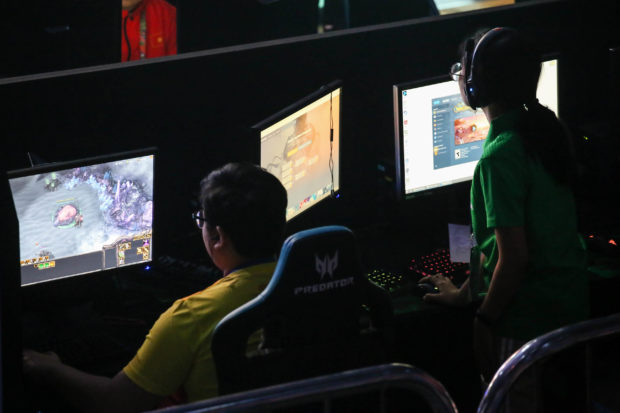
A partnership hopes to show parents, schools that there is a future for kids into esports. —JAM STA. ROSA
It’s now 1 in the morning.
A door on the second floor of a house in Quezon City creaks open and Claribel Apigo, peers at a familiar sight—an empty room.
“Ang hilig talaga mag puyat ng batang ‘to (this kid really loves to stay up late),” she mumbles, dialing her son’s mobile number and playing out a scene that seemes to be on loop.
In a makeshift computer shop just across the street from their house, her son is currently engaged in a fight. But the intense battle was being waged somewhere else—in the fictional world of Runeterra from one of the most popular games, League of Legends.
It is a never-ending back-and-forth between mother and son. Buen Clarence Apigo gets lost in video game worlds while Claribel tries to pull him out of it.
That struggle is at a crossroads now, as gaming has evolved into esports, and people are making sure the growth of the video game phenomenon and its transportation into a legitimate and aspirational discipline populated with professionals.
And at the crossroads lies a path leading into campuses and pushes straight into a landscape featuring a vastly different gaming culture in the Philippines.
Recently, Mineski Global launched a partnership with the Philippine Collegiate Champions League (PCCL), an organization best known for bringing the top basketball programs from the UAAP, NCAA and other varsity bodies to a single battle-of-champions tournament.
That partnership will hold the first national collegiate league for esports in the country, the National Interschool Cyber league under the banner of the Youth Esports Program (YEP). That puts esports squarely inside campuses, something that should change the dynamic in households like that of the Apigos.
The partnership hopes to engage more than 1,000 students across 200 schools all over the country.
“It’s not just gonna be about a tournament; tournaments [are] something that always gets into the esports aspect. But it’s much beyond that,” said Ronald Robins, CEO and founder of Mineski Global.
Video gaming has long been the bane of campuses—and of exasperated parents whose children spend a long layover inside computer shops when returning home from school—and YEP hopes to make esports part of schools.
Mineski and PCCL approach the situation with a different mindset: Teach esports athletes how to be responsible gamers—including time management, so that no gamer is still out dueling at 1 a.m. That means reaching out to teachers and parents and teaching them how to better engage gamers.
“We strongly believe that starting from the schools is actually very important to us. Having this thorough understanding actually brings us more chances of succeeding in the future in educating the youth of how esports should be tackled,” Robins said.
Using its background in IT and logistical expertise, Mineski is also looking to set up esports laboratories inside campuses.
All this is geared toward enlightening parents about how there is a future for their gamer-offsprings in esports.
It’s not a new concept. Even traditional sports were once viewed as an intrusion to academics and parents would set schedules for their kids’ sporting interests.
“If you think about it … 15, 20 years ago it was the same with basketball. Our parents would also tell us ‘don’t play basketball you won’t have a future there,’” said former PBA and national coach Chot Reyes, who will head PCCL Esports.
“We are at the cusp of something special here,” he added.
Claribel Apigo certainly hopes so. With the recent Southeast Asian Games adding esports to a calendar and national athletes earning millions for gold medal efforts, she is slowly looking at video gaming differently.
“Of course, these will be beneficial to my son and I will be there to support him 100 percent” she said, adding that she is aware of the potential of gamers representing the country in major international meets.
“He will bring glory to the Philippines if he [gets that chance],” Claribel said, a part of her still clinging to her traditional roots.
“As long as he does not forget his academics along the way.”
Mineski and PCCL hope to take care of that problem.